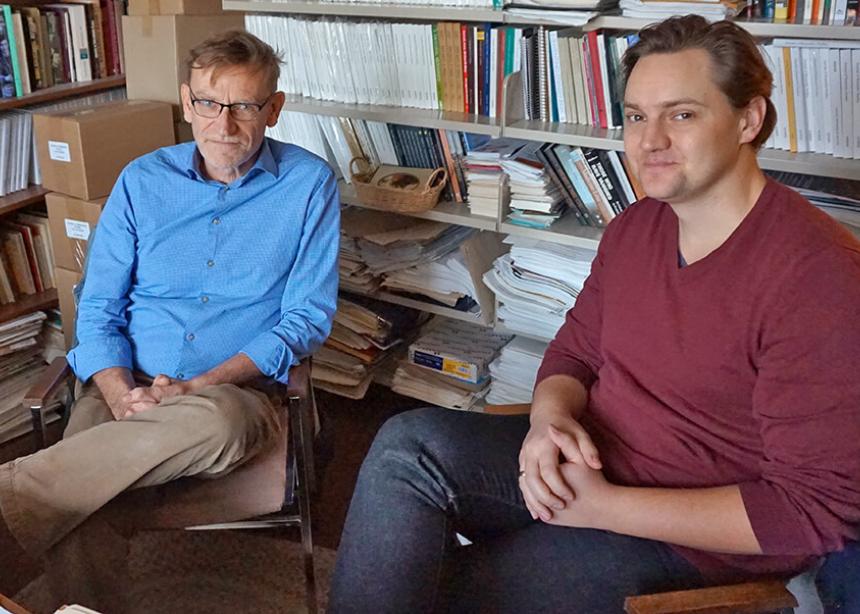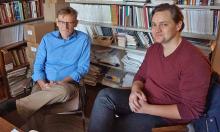A filmmaker is teaming up with a historian to document how Mennonite farmers relate to the land in seven different communities around the globe.
“When you get down to grassroots, people bring their faith to bear on their relationship to the land in very different ways,” says Mennonite historian Royden Loewen. “If you go to Altona [Man.] and ask a farmer there who farms 3,000 acres of land, ‘How does your faith affect your farming?’ they’ll say, ‘Well I donate a portion of my crops to Canadian Foodgrains Bank.’ If you go to Java and talk to a Javanese farmer, they’ll say, ‘God can become angry at you and there will be storms.’ The land has a spiritual quality to it. If you talk to a Low German-speaking person in Omsk, Siberia, who spent their life on a collective farm, faith means feeding their family in a particular way. In Bolivia, most of the Mennonites are Old Colony people. They’re on the farm because they’ve been called to live a life of simplicity. But they don’t have anything against using GMO [genetically modified organism] crops. So they’ll have a steel-wheeled tractor pulling Monsanto’s Roundup onto GMO soybeans.
“People draw the line on ethics and religion in very different ways,” he says.
In the coming months, Paul Plett, a Winnipeg-based filmmaker, plans to take his camera to seven Mennonite communities in Bolivia, Siberia, the Netherlands, Zimbabwe, Java, Manitoba and Iowa.
The film will be based on a three-year research project led by Loewen, who chairs the Mennonite studies department at the University of Winnipeg. In 2013, Loewen received a $239,000 grant from the Social Sciences Humanities Research Council of Canada to explore Mennonite relationships with the land in different parts of the world. He put together a team of seven graduate and post-graduate researchers to conduct interviews and research in seven Mennonite communities.
Other studies have examined Mennonite relationships to the land, says Loewen, but what sets his project apart is its global scope and its historical nature. “The research . . . will tell us what happened in the 20th century in the last four generations,” he says. “What happens during a time when there is a fundamental shift in the way humans relate to land?”
During the 20th century, agriculture around the world was dramatically altered by four things, he says:
- The mechanization of technology.
- The development of synthetic fertilizers and pesticides.
- Government involvement in how farmers cultivate their land.
- The globalization of food markets.
The research will compare how Mennonite farmers around the world have faced those major changes.
“It’s by comparison that things become more clear to us,” says Loewen. “The different environments are quite striking. We’re comparing the global South and North, we’re comparing the Communist central plan government with governments from the Global South, which had the UN on their backs to join the ‘green revolution’ and modernize their farming. . . . We’re dealing with post-colonial environments. . . . All the big global complexities of the 20th century are seen through the prisms of these microcosms.”
The research project will wrap up in the fall of 2016 with a conference at the University of Winnipeg. The Journal of Mennonite Studies will publish research papers on the seven communities.
With the research, Loewen plans to write a book called Seven Points on Earth. Meanwhile, Plett is raising funds to allow him to travel and shoot the film. Any donation to the project made through Mennonite Studies at the University of Winnipeg will receive a tax-deductible receipt.
“This story fascinates me and I really want to tell it in the best way possible,” says Plett. “To do that, I need to visit all seven locations.”




Add new comment
Canadian Mennonite invites comments and encourages constructive discussion about our content. Actual full names (first and last) are required. Comments are moderated and may be edited. They will not appear online until approved and will be posted during business hours. Some comments may be reproduced in print.